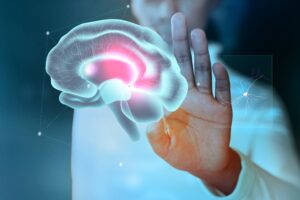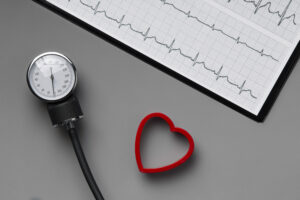
Perimenopause – What Most Women Aren’t Told
Everyone’s heard of menopause, “THE” change a woman goes through in their 50/60’s. We hear about the hot and cold flashes, mood swings, hormone therapy, and other symptoms that sound more than a little uncomfortable. The idea is that all of a sudden BAM, you start feeling horrible, miss periods and the change has begun.
But there’s something else women experience – something that our mothers and their mothers don’t tell us … probably because they don’t even know themselves.
It’s called Perimenopause. Let’s take a closer look at what it is, how it affects, the body, and what women can do about it.
Wait, What?! There’s More to This?
Menopause doesn’t really just pounce. It sneaks up slowly and perimenopause is part of the process, sort of the transition period. Because it really wouldn’t be fair to dump all of that change on someone at once.
It can start as early as your mid-30s or as late as your mid-50s. Some people experience it for just a short time, but the other end of the spectrum can have it for 4 to 8 years. But the general consensus is that it starts 10 years before you hit the big change. It’s only when you haven’t had a period for 12 months has menopause officially started.
What Happens During Perimenopause?
- Estrogen Changes –The general idea is that it slowly starts to lessen. But it can also fluctuate a lot.
- Cycles Changes –because of fluctuating hormones women can find their periods becoming shorter, longer, lighter, heavier, or even spotting.
- Fertility Declines – Women can still become pregnant during this time. It just becomes harder.
- Trouble Sleeping – This one should be no surprise. With all the changes that are happening in the body, it’s easy to see how someone can become depleted or more tired than usual but still have issues getting healthy rest.
- Mood Swings or Depression – Some studies show that fluctuating levels of the female hormone estradiol are one predictor of depression. Stressful life events such as a divorce, job loss, or the death of a parent are common things for people in this stage of life and huge triggers for depression.

Perimenopause Cognitive Study
There have been plenty of studies about how cognitive functions change during menopause. But what happens during the time before? One study looked at a cross-section of women across different stages of end-stage reproduction.
“We hypothesized that women in late menopausal transition and early post-menopause would perform more poorly than those in the late reproductive stage on attention and verbal memory tasks and that estradiol, depressive symptoms, anxiety symptoms, hot flashes, and sleep disturbance would predict cognitive performance on those tasks.” Miriam T Weber 1, Leah H Rubin, Pauline M Maki.
One hundred and seventeen women took part in the study that included a neuropsychological series of tests assessing six domains of cognition, assessed menopausal symptoms, and measured serum levels of estradiol and follicle-stimulating hormone.
But what was the result? Was there a noticeable change in cognitive skills once perimenopause started?
Women in the first year of post-menopause performed significantly worse than women in the late reproductive and late menopausal transition stages on measures of verbal learning, verbal memory, and motor function. They also performed significantly worse than women in the late menopausal transition stage on attention/working memory tasks.
Basically, the first year after your last period takes the hardest hit when it comes to cognitive functions. There’s no “linear” change.
What Can You Do During Perimenopause?
The urge might be to run out, buy a gallon of estrogen, and swim in it, but please don’t do that! The most important thing to remember is that any treatments should be at the consultation of a medical professional. So, if you’re worried, just start with a doctor’s visit. However, there are some simple things that are part of a generally healthy lifestyle that are a good idea to adopt.
Healthy Diet
Have you noticed this is a common suggestion from many doctors for so many ailments? It’s not a coincidence!
Taking care of our bodies with a balanced diet (full of fruits, veggies, limited meat, fiber, water, etc.) gives them the nutrients and energy it needs to perform well. Some doctors might also recommend getting more calcium in your diet, maybe even a multivitamin – but ask first.

Be Active
Same story! But when your healthcare provider says “exercise” it doesn’t mean you have to join a gym.
It can mean walking around the block a few times. Take your dog out or play with him more. Do little things that get you out of your chair more and get your body moving! Get those muscles moving and blood circulating!
Avoid Smoking & Alcohol
Having a drink here and there in moderation isn’t going to hurt anything. But quitting smoking will go miles towards better health. Studies have shown that smoking can bring on menopausal symptoms quicker or make them worse (among other unpleasant side effects). For example, smoking can muck around with your hormone levels.
Intimate Creams
A woman’s natural moisture might also reduce. If that’s the case, it’s as easy as buying a personal lubricant. However, ignore all those flashing ones that promise heating, cooling, or tingling. Water-base lubricate is always the way to go. Research online for reliable brands.
Perimenopause Conclusion
This entire thing might feel like something to freak out about. However, it’s not. You’re ok! It’s a natural part of a woman’s life cycle. It’s mostly the symptoms that can be a pain. The good news is that there is plenty we can do to manage any issues that pop up.
And, the most important part of all, is that now you know it exists! So, if things start feeling freaky in your 40s, you might have something to ask your doctor about.














